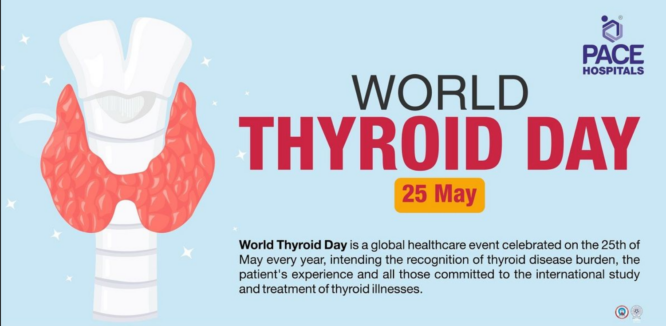
World Thyroid Day: How does gut health affect thyroid? 2023
Sanjh
- 0
The thyroid is a crucial organ in the body that produces the essential thyroid hormone. This hormone is essential for many fundamental bodily processes, including metabolism and growth.
Insufficiency or excess of thyroid hormone causes thyroid diseases, which increase the risk of other aspects of health, such as menstruation, gastrointestinal issues, and cardiovascular health. This World Thyroid Day, let’s examine the relationship between the thyroid and gastrointestinal health.

Can thyroid conditions induce digestive issues?
According to Dr. Amit Miglani, Director and Head of the Department of Gastroenterology at the Asian Hospital in Faridabad, thyroid issues can induce gastrointestinal issues.
“The thyroid gland serves a crucial role in the regulation of numerous bodily functions, including metabolism and digestion.
When the thyroid gland produces too many (hyperthyroidism) or too few (hypothyroidism) thyroid hormones, it can affect the digestive system and contribute to gastrointestinal problems, according to Dr. Miglani.
What digestive health symptoms are associated with thyroid disease?
The expert explains that several gastrointestinal symptoms may accompany thyroid disease.
Patients with hyperthyroidism, characterized by an overproduction of thyroid hormones, may experience increased bowel movements or diarrhoea, which may be frequent and watery. They may also experience an increased appetite and abdominal pain due to unintentional weight loss.
Hypothyroidism, which is characterized by an underactive thyroid gland, can result in constipation, bloating, and a diminished appetite. Additionally, some individuals may experience abdominal pain, flatulence, or indigestion.

Dr. Miglani adds, “It is important to note that these symptoms can vary from person to person, and not everyone with thyroid disease will experience gastrointestinal issues.”
Tips for managing thyroid-related digestive health conditions
If you are experiencing digestive issues as a result of thyroid issues, the following strategies may assist you in managing these symptoms:
- Maintain a wholesome diet
Include a sufficient amount of fiber-rich foods in your diet, such as fruits, vegetables, and whole cereals. This can aid in relieving constipation and normalizing bowel movements.
- Stay nourished
Consume copious amounts of water throughout the day to prevent dehydration and support digestion.
- Monitor your iodine consumption.
Iodine is necessary for thyroid function, but excessive or insufficient intake can negatively affect thyroid health. Consult your physician or a registered dietitian to ascertain the appropriate iodine levels for your particular condition.
- Consume modest meals more frequently
Smaller, more frequent meals can alleviate digestive discomfort and prevent bloating.
- Manage tension levels
Stress can exacerbate thyroid and digestive disorders. Engage in relaxing activities such as meditation, deep breathing exercises, or enjoyable pastimes.
- Comply with your prescribed therapy
It is essential to adhere to the thyroid medication and treatment plan prescribed by your physician. This stabilizes your thyroid hormone levels, which over time can alleviate your gastrointestinal symptoms.
Remember that it is crucial to discuss any concerns or symptoms you are experiencing with your healthcare provider, as they can provide individualized recommendations based on your specific situation.


